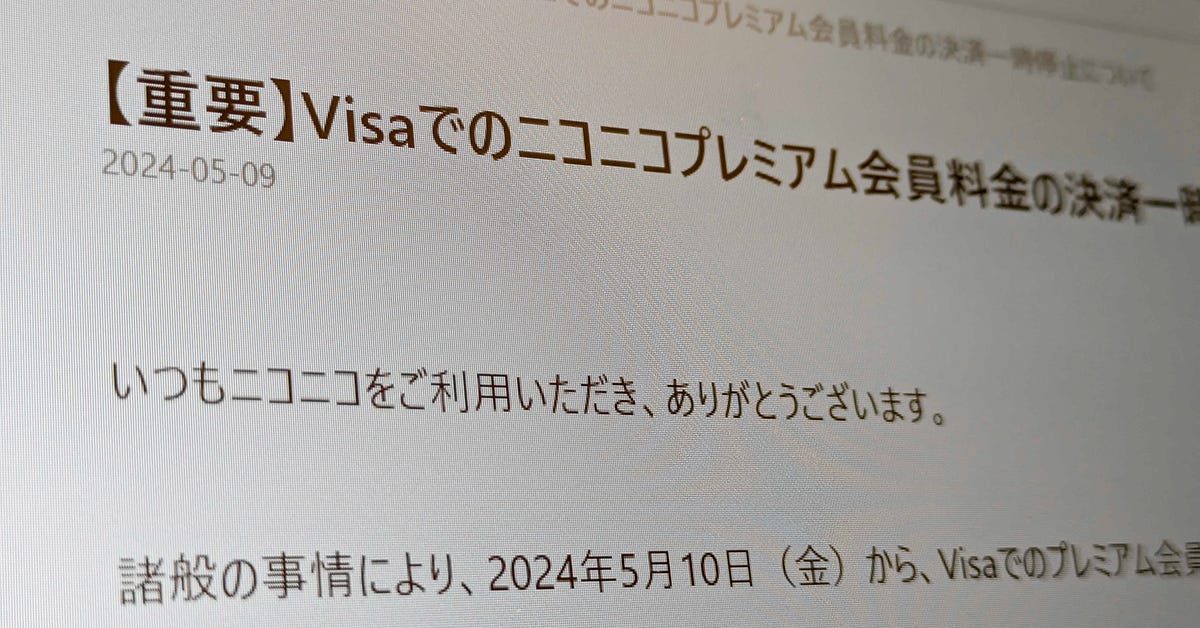Anime funding companies see sales rise
Plus: Sony Music bids on a top five manga app; Scholars retrace anime studio labor histories; Niconico suspends Visa credit card payments; and more
This is your weekly Animenomics briefing, covering the business of anime and manga. Today is Wednesday, May 15, 2024.
In case you missed it: Frieren: Beyond Journey’s End was named the boys’ manga category winner in the 48th Kodansha Manga Awards, marking the first time in six years that a title not published by Kodansha has won the category.
I See Your Face, Turned Away won the girls’ manga category, while Medalist was the winner of the general manga category.
Anime companies report strong fiscal year sales growth

Many companies involved in anime planning and production publish earnings results this month for the fiscal year ending March 2024. Below is a selection of recent earnings reports.
Kadokawa Corporation’s anime business saw net sales grow 8.6 percent over the previous fiscal year, in part thanks to rights licensing sales for domestic and international streaming.
International licensing sales jumped significantly in the January to March quarter, driven primarily by Delicious in Dungeon (acquired by Netflix) and Ishura (Disney+ and Hulu).
Kadokawa’s five highest-selling anime properties are Oshi no Ko (¥3.6 billion, or US$23 million, in rights sales), My Happy Marriage, The Eminence in Shadow, Re:Zero: Starting Life in Another World, and Bungo Stray Dogs.
Print manga and light novel sales, which account for 44 percent of total print book and magazine sales, fell 13.6 percent from the previous year. On the other hand, digital manga sales climbed 12 percent.
Sony Group Corporation said its Sony Pictures business, which includes the anime streaming service Crunchyroll, saw net sales grow 9 percent on a yen basis and 2 percent on a U.S. dollar basis.
What they’re saying: “Regarding Crunchyroll, we are expecting it to contribute even more to the operating income of the entire segment due to sales growth primarily from an increase in global paying subscribers and the overseas distribution of anime product,” Sony senior vice president Naomi Matsuoka added in Tuesday’s earnings presentation.
Chief operating officer and chief financial officer Hiroki Totoki declined to comment on a report of Sony’s bid to buy digital manga and IT services company Infocom when asked by Bloomberg Japan.
Bandai Namco Holdings saw total group revenue cross ¥1 trillion (US$6.7 billion) for the first time, rising 6.1 percent on strong sales by anime and toy IPs such as Mobile Suit Gundam, Dragon Ball, and One Piece.
Sales related to Mobile Suit Gundam grew 11 percent to a franchise record ¥145.7 billion (US$932 million), boosted by the successes of the Mobile Suit Gundam: The Witch from Mercury and Mobile Suit Gundam Seed Freedom anime.
Bandai Namco says half of Gundam plastic model kit sales revenue now comes from outside Japan.
Music conglomerate Avex’s anime and visual contents business segment, which includes live-action content, reported net sales growth of 5.7 percent but fell into a deficit due to a decrease in profit margin and increase in cost of sales.
Avex says it remains committed to anime IP creation and development but is tempering outlook in this business because of soaring production costs and lack of production capacity.
Nippon Television Holdings saw anime content sales jumping 79.7 percent over the previous fiscal year due to strong international sales and the acquisition of Studio Ghibli as a subsidiary.
Frieren: Beyond Journey’s End (aired by Nippon TV) and The Apothecary Diaries (sales outside Asia by Nippon TV) were considered “spectacular successes”, driving sales of their original manga.
Fuji Media Holdings reported a 61.8 percent sales growth in its anime content development business, driven by international streaming demand for titles like Ranking of Kings.
Revenue from the merchandising business related to anime also grew by 42.2 percent over the previous fiscal year.
Square Enix Holdings reported a 6.5 percent growth in both its print and digital manga publishing business, which experienced a windfall from the popularity of The Apothecary Diaries.
Sony Music makes a bid for Mecha Comic manga app
Sony Music Entertainment is bidding to buy IT services company Infocom, which owns the digital manga platform Mecha Comic and webtoon app Peanutoon, in a deal worth around ¥200 billion (US$1.3 billion), Bloomberg reports.
Why it matters: Mecha Comic was Japan’s fifth most popular manga app last year, according to data compiled by Sensor Tower, and is the rare digital manga platform not owned by a comics or publishing industry parent company.
Chemicals and textiles manufacturer Teijin is currently Infocom’s majority owner, controlling just over half of the company’s shares.
The details: Sony Music Entertainment and Japanese private equity firm Integral are competing against global private equity funds Blackstone and KKR on a plan to buy out Teijin’s shares and take Tokyo Stock Exchange-listed Infocom private.
Teijin, whose stock fell to a 52-week low in February, is under pressure from investors to sell non-core businesses and focus on long-term growth.
Infocom’s digital manga business reported a 23-percent sales growth and a 25-percent profit growth in the recent fiscal year ending March 2024.
If Sony Music wins the deal, the anime production subsidiary Aniplex could expand its portfolio of anime and manga IPs.
Zoom out: “In terms of the domestic digital comics platform business, this timing is when we can expect the most profit from sales in the [mergers and acquisitions] market,” Takeshi Kikuchi, a manga industry consultant, writes on his blog.
“Digital comics have been the driving force behind the rise of the Japanese manga market for the past 10 years, but growth in the domestic market has slowed and may be reaching a plateau,” he explains.
Yes, but: Kikuchi thinks this will be the first and last time a deal of this size happens with a digital manga platform, given that Mecha Comic’s larger competitors are already owned by publishing industry companies.
Of note: Women make up 80 percent of Mecha Comic users, thanks to a heavy focus on teens’ love (TL) and boys’ love (BL) romance titles.
In a 2021 interview with Toyo Keizai business magazine, Infocom chairman Norihiro Takehara attributes Mecha Comic’s success to a strong television advertising partnership with Dentsu that began in 2014.
Academics shed light on anime studio labor histories
“While fans have historically been ignorant to [anime worker] conditions, heightened awareness has been created in recent years primarily through critical media exposés, white papers from industry associations, and, most importantly, animators taking to social media to vent about their working lives and frustrations. As anime production has exploded, moreover, so has fan media, which also draws attention to the creators themselves. But for every smart blog discussing production issues with subtlety, there are a dozen ‘influencers’ downplaying problems or spreading misinformation.”
— Bryan Hikari Hartzheim, Waseda University associate professor of new media
Context: In his introduction to the Summer 2024 issue of Mechademia, the preeminent research journal of anime, manga, and other East Asian fan cultures, Hartzheim calls on fellow academic researchers to help give “nuance, lucidity, and insight” on working conditions in the anime industry.
Catch up quick: Anime fans on social media have become more aware of anime studio working conditions, particularly conditions at MAPPA, in the last few years.
Mechademia’s latest issue examines anime production from the 1950s to the present day by examining the work of several anime studios, tracing anime labor history, and exploring anime’s influence in other parts of East Asia.
Niconico platform suspends Visa credit card payments

Dwango’s Niconico video sharing service, which is popular among fans of anime and video games, became the latest Japanese platform to suspend payments using Visa credit cards last week.
Why it matters: Visa and international payment processors have been under pressure to discontinue support of websites hosting pornographic content, but Niconico isn’t known as a hub for pornography.
Between 2012 and 2018, Niconico partnered with Sumitomo Mitsui Card to release a Niconico-branded Visa credit card.
Catch up quick: DLsite, a marketplace for self-published manga and video games, suspended payments using Visa, Mastercard, and American Express cards last month as payment processors pressured the site to remove pornographic content.
While payment processors have taken action against pornographic sites for years, current efforts are driven by a 2022 ruling by the United States District Court for the Central District of California.
In Fleites v. MindGeek, a federal judge ruled that Visa can be found liable for enabling Pornhub to monetize a non-consensual pornographic video of a minor.
What we’re watching: “I am sometimes asked ‘Why is JCB still available for this kind of service?’ but I don’t have this information at this time,” financial services reporter Junya Suzuki writes in ITmedia, a technology web magazine.
For some of these platforms, Japanese payment processor JCB remains the only service whose credit cards can be used to make payments.
Animenomics is an independently-run and reader-supported publication. If you enjoyed this newsletter, consider sharing it with others.



